When jumping into Final Fantasy XIV for the first time, you will probably come across words like Roles, Classes, and Jobs. You might not have much of an idea of what they mean. But their differences are important to understanding and thriving in this game.
While they may seem similar, especially in the case of Classes and Jobs, there are nuances to each that give them a distinctive role in Square Enix’s MMORPG. This guide will explain everything you need to know about Roles, Classes and Jobs.
Advertisement
Roles
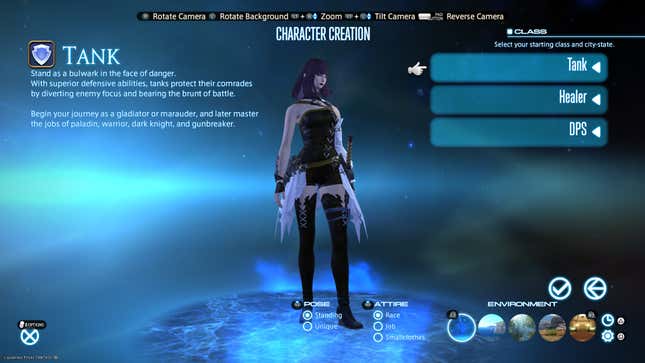
Advertisement
Roles are the categories that every Class and Job fall into. They broadly explain the specific function they are expected to fill in combat. Like other team based games, the three main roles are:
- Tanks
- DPS
- Healers
Tanks are expected to use their high health pools and defensive abilities to attract and sustain enemy attention (called “aggro” in many games, though FF14 calls it “enmity”). This causes enemies to attack Tanks instead of their more vulnerable teammates.
Advertisement
Read More: 10 Tips For Starting Out In Final Fantasy XIV
DPS roles are the primary method of damage output against enemies. Unlike the other two roles, DPS has three sub-roles:
Melee DPS like the Monk get in close to opponents and utilize positioning for maximum attrition
Advertisement
Physical Ranged DPS like the Bard class attack from a distance and offer consistent damage
Magical Ranged DPS like the Black Mage are not able to act as frequently as the other types due to the time it takes to cast their spells but are able to deal massive amounts of damage per attack.
Advertisement
The final role, Healers, make sure their allies’ HP do not reach zero. They also provide other useful buffs to give them and others the edge in combat.
Classes
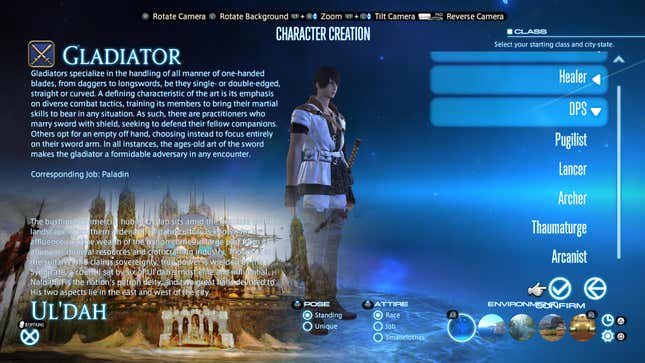
Advertisement
Classes are the entry point for new players. They will determine what type of skills you obtain and how you approach each combat encounter. When players are creating a new character, they will choose from one of eight Classes:
Tank Classes: Gladiator and Marauder
Melee DPS Classes: Pugilist and Lancer
Physical Ranged DPS Class: Archer
Magic Ranged DPS Classes: Thaumaturge and Arcanist.
Healing Class: Conjurer.
Each Class will have their own guild which will offer a unique questline and rewards specifically suited to that class. You are not locked into their initial class as once you complete its level 10 Quest, you’ll unlock the ability to swap to any other class by interacting with its respective Guild. This is also how players can obtain the Rogue Class, which is the only Class you can not start the game as.
Advertisement
Read More: The Best Class For Solo Players In Final Fantasy XIV
New players may place a large significance on Class, but while they are important early on, they tend to take a backseat around Level 30. That’s when the Class questline ends, giving access to a more powerful version of the Class.
Advertisement
Jobs
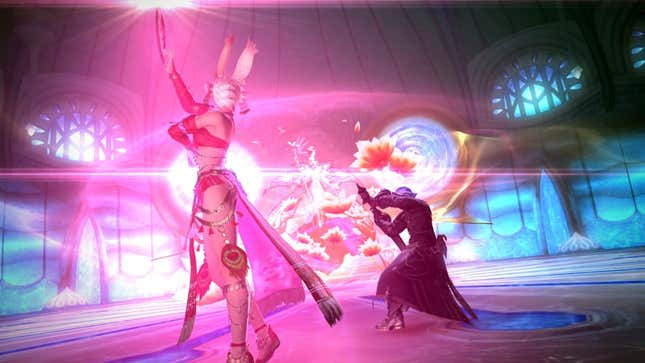
Advertisement
Jobs are specializations of Classes. However, they can not be used early in the gameAfter hitting Level 30 and completing the Level 20 Main Story Quest (MSQ), you’ll gain access to Jobs, though not all of them.
To get a Job, you’ll need a “Job Stone.” Many Jobs are obtained through different methods, though the ones available in the base game all share a similar condition: When each Class is leveled up to 30, you will be able to accept a specific quest which gives a Job Stone as its reward.
Advertisement
Read More: Final Fantasy XIV: A Beginner’s Guide To Questing
For example, if you are a Gladiator and reach level 30 (and complete the aforementioned MSQ), you will be able to accept the mission Paladin’s Pledge which then provides the Soul of the Paladin, allowing you to become that Job. You still won’t be able to equip the Monk Job Stone, as you won’t have it. You would have to repeat the process as a Pugilist Class to obtain it. Below is a list of all the Classes and the Jobs they turn into:
Tanks
Marauder – Warrior
Gladiator – Paladin
DPS
Pugilist – Monk
Lancer – Dragoon
Rogue – Ninja
Archer – Bard
Thaumaturge – Black Mage
Healer
Conjurer – White Mage
The Arcanist Class is special as after reaching level 30, you are able to pick from one of two Jobs, the DPS Job, Summoner or the Healer Job, Scholar,
Advertisement
So, how are Classes and Jobs different?
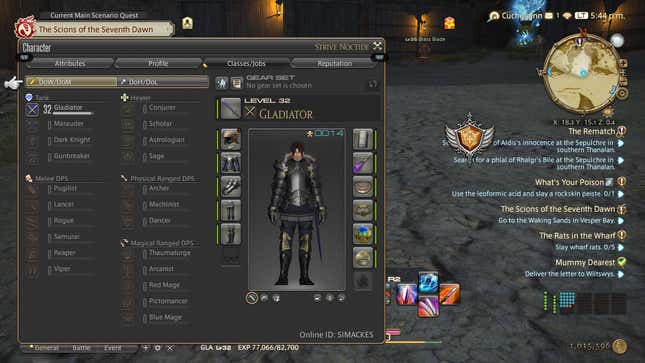
Advertisement
Gameplay-wise, Classes and Jobs aren’t totally different. Classes are best seen as an introduction to Jobs, teaching players the best practices for the specialization they will soon inherit. Once a Class’ corresponding Job Stone is unlocked, there isn’t really a good reason to not use it as it offers stat boosts far greater than the Class, and stronger abilities. Luckily, a Job will share the same level as its Class, so if you have not equipped the Soul Crystal for whatever reason, you are still making progress on that Job.
What about Jobs that don’t have a Class associated with them?
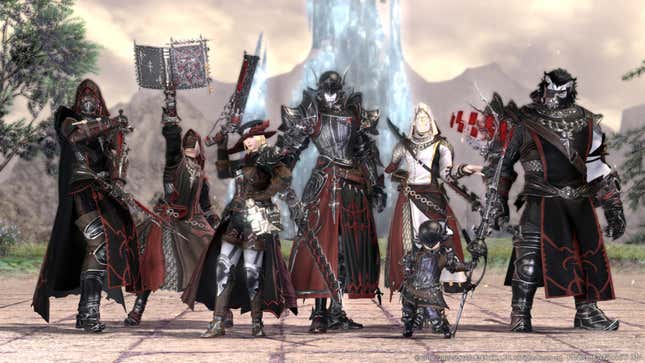
Advertisement
Even if they don’t have stem from a Class, you will still need a Job’s Soul Crystal to use it. Jobs like the Gunbreaker that were added in one of the game’s five expansions have their own specific requirements to accept their quest. In that example players must have purchased the Shadowbringers expansion and have leveled a combat Job (known as a Disciple of War or Disciple of Magic) past 60 to accept the Gunbreaker quest.
Read More: How To Unlock The New Viper And Pictomancer Jobs In Final Fantasy XIV: Dawntrail
Advertisement
Jobs that were added in the first expansion, Heavensward, have an extra requirement as the quests must be picked up in Isgard, which you can only reach by completing the base game, A Realm Reborn. Below is a list of the Jobs that were added in each expansion and their requirements. As a reminder, a Job is only available if you purchased its respective expansion.
Heavensward
Requirement: Reach Ishgard by completing A Realm Reborn and Level a Disciple of War or Disciple of Magic past 50
Advertisement
- Dark Knight (Tank)
- Machinist (Physical Ranged DPS)
- Astrologian (Healer)
Stormblood
Requirement: Level a Disciple of War or Disciple of Magic past Level 50.
- Samurai (Melee DPS)
- Red Mage (Magical Ranged DPS)
Shadowbringers
Requirement: Level a Disciple of War or Disciple of Magic Past Level 60.
- Gunbreaker (Tank)
- Dancer (Physical Ranged DPS)
Endwalker
Requirement: Level a Disciple of War or Disciple of Magic Level 70.
- Reaper (Melee DPS)
- Sage (Healer)
Dawntrail
Requirement: Level a Disciple of War or Disciple of Magic past Level 80.
- Viper (Melee DPS)
- Pictomancer (Magical Ranged DPS)
While Jobs and Classes are incredibly similar, it is important to remember that the former are advanced versions of the latter and should be used as soon as you receive them. The only reason you’ll want to focus on your Class after getting a Job is if you want to obtain a new Job which comes after learning a new Class. FF14 not only allows juggling multiple Jobs, but encourages it. Meanwhile, as the name implies, a Role is what you will be doing in combat to provide the best utility for your team. Now you know what all these terms mean, you can play Final Fantasy 14 like it’s your Job! (But, like, in a fun way).
Advertisement
.






